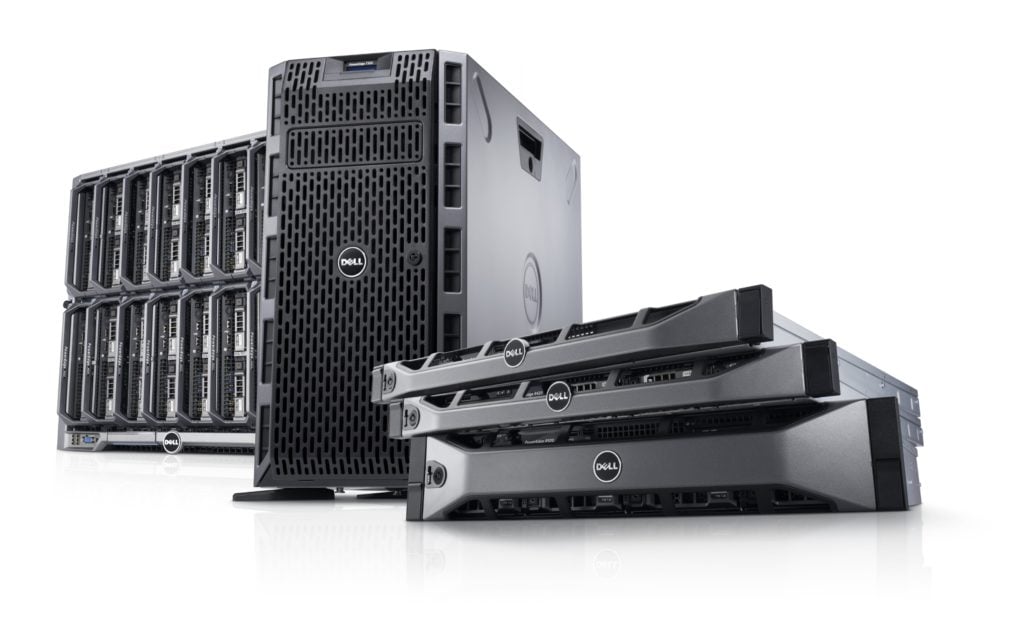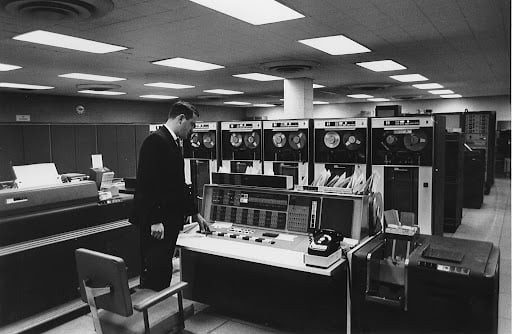Server
A server is a device dedicated to storing and providing data for clients (users) within a network. This might include the internet, a peer-to-peer network or a LAN.
Being a “server” is better described as a role a computer takes on. More or less any data storage device can perform this role. What’s essential is that it acts as a central host for files, and serves them to network clients.
In this definition...
How a server works
To function as a server, a computer first needs to be able to “listen” for requests from devices connected to its network. This listening capability can either be built into the device’s operating system, or installed via an application.
A good example of a client-server relationship is your email provider. Each time you send or receive an email, the client (your computer) communicates with the email provider’s server to carry out the request.
When a client device needs files or data, it transmits a request over the network. The server computer constantly listens, and responds with the information. This dynamic is known as the call and response model.
Of course, this is a vastly simplified account of the process. Servers undertake multiple different steps simultaneously when responding to requests. These include:
- verifying the identity of the client
- ensuring the client has the relevant permission to access the files
- formatting the transmitted data properly
Types of Servers
Generally, these high-powered machines can be broken down by functionality, or their dedicated role.
Different types of servers play one or multiple jobs. They might serve email and multimedia content, protect internal networks or host web applications.
Web servers are computers that deliver (or serve) web pages. Each time a user navigates to that website, its dedicated server returns the correct page. Each one has an IP address and possibly a domain name.
Proxy Server
A proxy server is an intermediary between a user (you) and the server of your internet service provider. Your connection will be routed through this proxy before reaching your ISP server. Doing this conceals your true IP address, by showing the IP address of the proxy instead. You might use a proxy to obfuscate your location, which enables you to access geo-blocked content.
Dedicated Server
Some servers playing a specific role for their host organization. Machines might be dedicated to load balancing, communications, or printing.
Application Server
An application server is a program that handles all application operations between users and an organization’s back-end business applications or databases. They can manage complex transaction-based software programs.
Mail Server
A mail server is the hardware or software responsible for establishing, securing, and maintaining email communications for an organization. It ensures inbound and outbound email traffic for routine and large data transfers protects sensitive data.
Cloud Server
Cloud servers are services made available to customers on-demand via the internet. Rather than being provided by a single machine, cloud server hosting services come by multiple connected servers that comprise a cloud.
Virtual Server
A virtual server is one of many small, independent sub-services within a larger machine. Each virtual server works independently of the others. This means one machine can serve many different users.
Think of it as a locker within a locker room. Many different people can have a locker, and all lockers operate independently of one another. The room as a whole is the master machine, while each locker is a virtual server.
Many can act as one cluster, increasing an organization’s ability to deploy high-performance computing. Containers take that further by creating an encapsulated application with its operating environment.
Key components of a server
Although any computer can perform the functions of a server, they might not do so optimally. With specific demands on their system, they operate better with dedicated components.
A dedicated machine is engineered to manage, store, send, and process data around the clock. Modern versions offer far more performance, redundancy, and security features than a standard desktop computer, making them critical to developing IT infrastructure.
Server Hardware

One of the best choices for a small business is a dedicated server to provide features and expansion options that a desktop computer lacks. Established organizations are better off obtaining one of the many available commercial alternatives offering the latest features and infrastructure investment.
Before investing in hardware, buyers need to consider many things. This includes the server operating system, applications, energy consumption, storage, processing power, form factor, memory (RAM), and more.
The top specialized hardware vendors include Cisco, Dell, Fujitsu, HPE, Huawei, IBM, Inspur, and Oracle.
Server Processors
Central processing units have long been the core processors in computers and servers responsible for receiving end-user instructions and executing routine tasks and increasingly advanced workloads like machine learning. Modern servers use traditional CPUs as well as graphics processing units (GPUs), field-programmable gate arrays (FPGA), and application-specific integrated circuits (ASIC).
The server processing industry, also known as semiconductors, is made up of vendors like AMD, GlobalFoundries, HPE, Intel, Motorola, NVIDIA, and Qualcomm.

Server Software
Specialized hardware requires embedded or additional software for administrators to manage and maintain operations adequately. Organizations can find a multitude of software options, depending on desired functionality.
Server operating systems are the underlying software providing administrators with a command-line interface or GUI display for managing users, devices, security, and patching for a client network. Popular commercial and open source operating systems include:
- Linux OS/Unix OS/Ubuntu LTS
- Windows OS
- Open Enterprise OS
- Red Hat Enterprise Linux OS
- macOS
| Blade Servers | Rack Servers | Tower Servers |
| These devices offer the densest build with a circuit board enclosure that requires minimal cabling and maintenance. | These devices are mountable and less dense but ideal for SMB to enterprise organizations that can manage ongoing maintenance. | These machines are a vertical, standalone enclosure and least dense with low maintenance and ideal for smaller organizations and teams. |

The History of Servers

These pecialized computers started alongside the beginning of modern computing with the engineering and use of colossal mainframes. With the introduction of personal computers in the 1970s and 1980s, a growing number of enterprise organizations deployed the more compact and accessible machines, now seen in data centers for almost four decades.
Modern Processing Performance
Advancements in processing power, like the latest GPUs, offer even stronger performance for organizations in a smaller physical footprint.
Data centers face cooling requirements, extensive noise, and reliable power to keep rows of dedicated and multi-use servers running for one or multiple organizations.
Deploying Cloud and Virtual Servers
With the introduction of cloud computing, organizations can now avoid paying for, managing, and maintaining on-premises or remote data centers and build needed infrastructure through a cloud service provider.
Similarly, virtualization and containerization ensure organizations make the most of existing hardware and are essential to modern software development and deployment. Any home-user can virtualize their hardware with open source solutions, but enterprise virtualization software can offer added scalability, security, patching, and support for Kubernetes.


Server Software
Specialized hardware requires embedded or additional software for administrators to manage and maintain operations adequately. Organizations can find a multitude of software options, depending on desired functionality.
Server operating systems are the underlying software providing administrators with a command-line interface or GUI display for managing users, devices, security, and patching for a client network. Popular commercial and open source operating systems include:
- Linux OS/Unix OS/Ubuntu LTS
- Windows OS
- Open Enterprise OS
- Red Hat Enterprise Linux OS
- macOS
| Blade Servers | Rack Servers | Tower Servers |
| These devices offer the densest build with a circuit board enclosure that requires minimal cabling and maintenance. | These devices are mountable and less dense but ideal for SMB to enterprise organizations that can manage ongoing maintenance. | These machines are a vertical, standalone enclosure and least dense with low maintenance and ideal for smaller organizations and teams. |

The History of Servers

These pecialized computers started alongside the beginning of modern computing with the engineering and use of colossal mainframes. With the introduction of personal computers in the 1970s and 1980s, a growing number of enterprise organizations deployed the more compact and accessible machines, now seen in data centers for almost four decades.
Modern Processing Performance
Advancements in processing power, like the latest GPUs, offer even stronger performance for organizations in a smaller physical footprint.
Data centers face cooling requirements, extensive noise, and reliable power to keep rows of dedicated and multi-use servers running for one or multiple organizations.
Deploying Cloud and Virtual Servers
With the introduction of cloud computing, organizations can now avoid paying for, managing, and maintaining on-premises or remote data centers and build needed infrastructure through a cloud service provider.
Similarly, virtualization and containerization ensure organizations make the most of existing hardware and are essential to modern software development and deployment. Any home-user can virtualize their hardware with open source solutions, but enterprise virtualization software can offer added scalability, security, patching, and support for Kubernetes.


